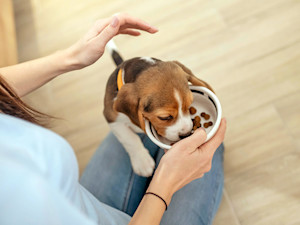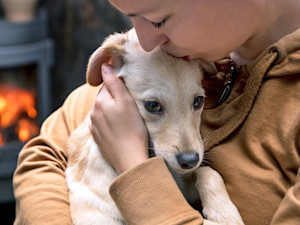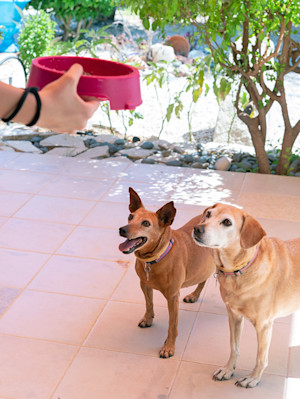Complete List of Human Foods Your Puppy Can Eat (and What They Can’t)
Because wanting to eat everything and being able to eat everything are two very different things.
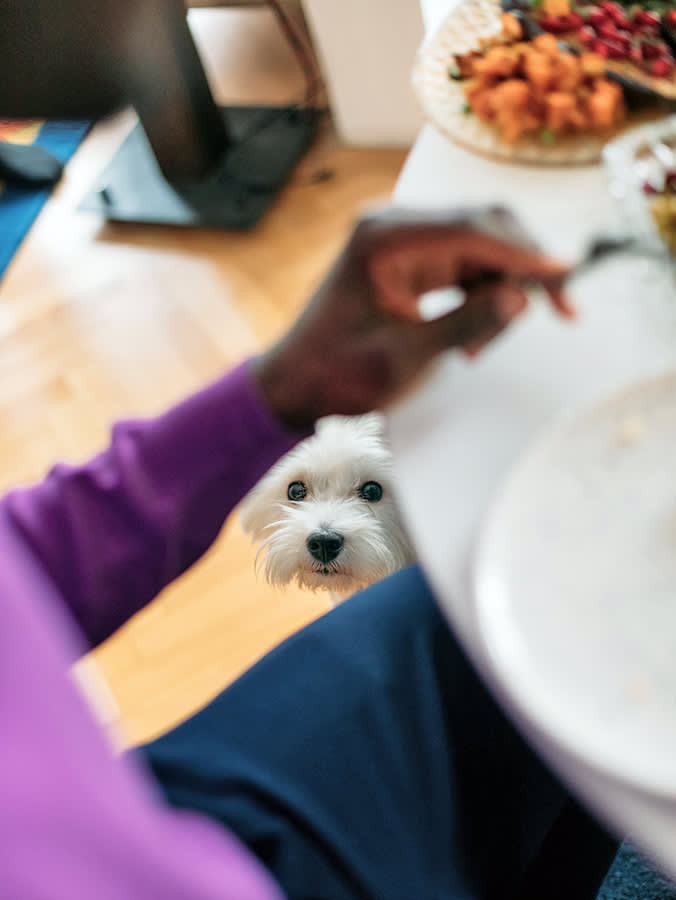
Share Article
In This Article:
Puppy Nutritional Needs Human Food That’s Safe for Puppies Human Food Puppies Should Avoid
Most puppies successfully master the art of begging for food by the time they enter your home, and they are adept at using all of their adorableness to get it. While it can be extremely difficult to resist those pleading puppy dog eyes and not slip your puppy a bite of your breakfast, you have to know which human foods are safe for your puppy to eat. Some foods may be perfectly harmless, but others could actually be toxic to them. Read on, for a list of common human foods your puppy can and can’t eat.
Main takeaways
Puppies don’t need to eat human food. They should get all their nutrition from high-quality, balanced dog food.
Some human foods, such as certain vegetables, can make safe and healthy training treats.
Don’t give your puppy any human foods without first clearing them with your veterinarian.
Understanding puppy nutritional needs
Puppies need a healthy balance of food from the six major nutrient categories: protein, fat, carbohydrates, vitamins, minerals, and water. Compared to adults, puppies should have higher amounts of protein, fat, calcium, and docosahexaenoic acid (DHA)opens in new tab to support proper growth and development.
You may notice that these requirements are similar to those for a human baby. But that doesn’t mean you should fix your puppy a bottle of infant formula or give your toddler puppy kibble to snack on. Human foods and dog foods are very different.

Human food vs. dog food
Yes, both human and dog foods contain the same nutrients, but that doesn’t make them the same. Human foods contain a portion of nutrients: There’s no such thing as human food that contains all the nutrition that you need in one serving. That’s why you mix and match proteins with vegetables and whole grains — to create tasty, wholesome meals.
Dogs, on the other hand, typically get all they need in one product. They don’t get the chance to be creative and change up the flavors and colors of their meals. Dogs don’t seem to mind the monotony, but it means that changes to their diet can lead to an upset in the balance of their nutrition. So, if a dog were to eat a bunch of human food one day and neglect their kibble, they could be missing out on important nutrients that the human food lacks.
Also, let’s not forget that some human food can be harmful to our pups, especially growing puppy bodies. Some foods are outright toxic, while others are high in salt and fat which can be detrimental to them — as can food containing lactose.
Puppies don’t need human foods to meet their nutrient requirements if they are eating high-quality, complete, balanced dog food. But there may be times when you want to use human foods as treats or mix-ins to liven up their dinners. You may even find yourself needing short-term substitutesopens in new tab if you run out of regular puppy food.
Human food that’s safe for puppies to eat
Below is a list of some of the common human foods that your puppy can consume in moderation. Always talk to your vet before giving your puppy any human foods to make sure they are healthy choices for your particular puppy, and to get an idea of a proper serving size.
Watch your puppy closely after giving them any new human food. Vomiting, diarrhea, stomach pain, and loss of appetite may follow if they are sensitive to any human foods. Some dogs may also be allergic to some human foods, potentially causing symptoms such as itchy skin, chronic ear infections, or rashes. In the future, you’ll definitely want to avoid giving your puppy any foods that cause an adverse reaction in them.
Fruits
Fruits are tasty treats your puppy is sure to enjoy, but the sugar that provides all of that taste isn’t good in high amounts. Because of this, you’ll want to feed fruit sparingly — say, just a bite or two a few times a week.
To prepare fruit for your puppy, thoroughly wash it and remove any large seeds or pits. Also remove any rinds, peels, or thick skins, and cut it into bite-sized chunks. You can serve fruits raw or cooked, just don’t add any sugar or other flavorings. Your puppy will enjoy them just the same. Here are some fruits that are good for pups:
Apples
Berries such as raspberries, blueberries, strawberries
Bananas
Watermelon, honeydew, cantaloupe
Pumpkin, squash
Pears
Peaches, plums, apricots
Unsweetened coconut
Vegetables
Using veggies as a special treat is a great way to add some valuable vitamins and fiber to your pup’s diet. Make sure to serve vegetables in moderation: Although they tend to be lower in sugar than fruits, they can still cause an upset stomach if you give your dog too much.
Again, you’ll want to wash all vegetables thoroughly and remove any thick skins. Cut into bite-sized chunks. Most veggies can be served raw, but your puppy will have an easier time digesting them if they are cooked. Here are some vegetables to consider giving them:
Carrots
Sweet potatoes
Green beans
Peans
Cucumbers
Spinach
Plain popcorn
Broccoli
Beets
Proteins
Your puppy’s food is likely packed with protein, but some pups prefer a protein treat over fruits or vegetables. Fortunately, there are many safe options to give them. Just remove any bones and excess fat. Thoroughly cook it first without using a lot of oil or butter. And serve plain without any seasonings. Bite-sized chunks are best:
Chicken
Turkey
Lean beef
Lean pork
Fish
Eggs
Natural peanut butter (don’t use the sugar-free variety, which could be toxic)
Dairy products
You’ll want to be careful giving your puppy dairy. Even though they thrived on their mother’s milk for several weeks, most dogs are actually lactose intolerantopens in new tab. Eating a lot of dairy can cause an upset stomach with vomiting, diarrhea, and lots of gas. Most yogurts and cheeses are lower in lactose than straight milk and can contain beneficial probiotics — so that may be the best option if you choose to give your dog dairy. Only give them a bite or two of the following every few days:
Yogurt
Milk
Whole grains
Whole grains can be a good source of energy and fiber for your growing puppy, but they don’t need a lot of them. Feed grains in moderation or as a part of a bland diet if your little one is feeling under the weather. Cook thoroughly, and serve without any seasonings. These whole grains, unlike bread or pasta, do not have added ingredients that your puppy doesn’t need:
Rice
Plain oatmeal
Quinoa
Human food that puppies should avoid
You’ll probably be able to find something on the “good human foods” list that your puppy will enjoy and that you can feel good about giving them. Still, let’s take a look at the naughty human foods list. These foods may be toxic to your puppy or not good for them, even in moderation:
Chocolate
Avocado
Onions and garlic (includes dried and powdered)
Grapes and raisins
Xylitol and other artificial sweeteners
Cherries
Citrus fruits
Alcohol
Raw eggs or meat
Ice cream
Spicy foods
Anything with caffeine
Macadamia nuts
Bones
Bottom line
Your puppy doesn’t need human food if they are eating high-quality dog food, which is formulated to provide the right nutrients in the right amounts.
But if you choose to give your puppy human food, be sure to speak to your veterinarian first to ensure that you are providing safe treats in the right portions.
References
“12 Health Benefits of DHA (Docosahexaenoic Acid).” Healthline. https://www.healthline.com/nutrition/dha-benefitsopens in new tab.
“Safely Feed Your Pup if You’ve Run Out of Dog Food.” Escalon Times. 2 Nov 2020. https://news.ncsu.edu/in-the-news/safely-feed-your-pup-if-youve-run-out-of-dog-foodopens in new tab.
Williams, Krista BSc, DVM and Robin Downing, DVM, CVPP, CCRP, DAAPM. “Feeding Growing Puppies.” VCA Animal Hospitals Canada. https://vcacanada.com/know-your-pet/feeding-growing-puppiesopens in new tab.
Williams, Krista BSc, DVM; Robin Downing, DVM, CVPP, CCRP, DAAPM. “Food Intolerance in Dogs.” VCA Animal Hospitals Canada. https://vcacanada.com/know-your-pet/adverse-reactions-to-food-in-dogsopens in new tab.
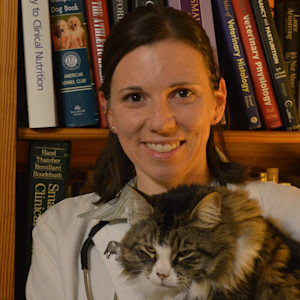
Dr. Chyrle Bonk, DVM
Dr. Chyrle Bonk has been a mixed-animal veterinarian since 2010, with a special interest in rehabilitation. When she's not practicing or writing about veterinary medicine, you may find her exploring the outdoors with her family or tending to her cows, horses, chickens, or cats and dogs.
Related articles
Why Won’t My Puppy Eat?
We asked two veterinarians for advice.
When Can a Puppy Eat Solid Food?
Yes, a question that also applies to human babies.
![Woman snuggling her puppy in her arms.]()
Puppy Diarrhea: Possible Causes and What to Do About It
Diarrhea in puppies can be caused by many things.
When Can Puppies Eat Wet Food?
![Two dogs waiting to be fed their dinner.]()
What Is the Best Time to Feed a Dog?
They tell you that every time of day is eating time, but you know better.


